RAWA representative, Heela Faryal, visited Turkey and Kurdistan on the invitation of the Women’s Freedom Movement (TJA), previously the Women’s Freedom Congress (KJA). During the 10-day trip, she met with Kurdish female leaders, mayors, and had meetings and workshops with several women’s organizations.
On March 21, 2017, she participated in the Newroz celebration in Amed (Diyarbakir) which was attended by more than one million people, despite great efforts by the Turkish state to discourage attendants. The celebration featured revolutionary songs, concerts and speeches by figures like Osman Daydemir (HDP parliamentary spokesperson), Dilek Ocalan (HDP MP), a mother representing Peace Mothers and Families of the Martyrs, Leyla Guven (DTK co-chair), Onur Hamzaoglu (HDK spokesperson), and Ahmet Turk (co-mayor o Mardin). The participants waved flags of HDP and slogans of “NO” in reference to the April referendum. In addition to songs and dances performed to honor Kurdish fighters and uphold their glorious struggle, Çiyager, the commander in Sur who resisted military attacks for months, was also honored during the celebrations. Delegations of foreigners from Italy, France, Spain, Switzerland, Norway, Ireland, and Scotland also attended the event.
Heela met with Ceylan Bağriyanik, head of Free Women’s Movement (TJA). She discussed the activities of the HDP party among women and exchanged information about the women’s struggle in Afghanistan. She said:
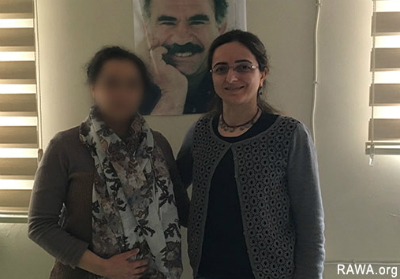
RAWA representative with Ceylan Bağriyanik, head of Free Women’s Movement (TJA). (Photo: RAWA.org)
“Our leader, Mr. Ocalan, says that women’s problems are men’s problems as well. Our movement’s new paradigm of activities is democratic, economic, ecological, and women liberation. This places women at the center of its struggle and women liberation as its solution. This idea has set in motion our women. Women who did not even dare to leave their homes, are now working because of this slogan of our movement… We have a system of self-organization for women in every field. That is how they realize their power and progress.”
She ended our conversation with these words:
“Talking to you was a very eye-opening experience. We send our special salutations to our comrades in Afghanistan. We are not together physically, but through our struggle, we are in each other’s presence. We have a saying, ‘we are travelers of the same road’. This gives us a very strong emotion. We have followed the women’s movement in Afghanistan since 1970s. This movement was very empowering to us. From now on, we will find common activities to do. An example is that in Afghanistan your movement can bring the Kurdish women’s system to life. I don’t mean that you follow our system because it is our system, but you should follow it because this system is for all women. It is important to come together physically, but it is more important to come together in a liberation system.”
Heela met with two groups made up of family members of those arrested and martyrs, particularly guerillas killed in the battles against the state. She met with mothers from “Peace Mothers”, and relatives of martyrs from “Meyadir”.
Raife, a mother from “Peace Mothers” said:
“We share stories similar to Afghan mothers. What Afghanistan mothers have lived, we have also lived. We know 2-3 people arrested from same families, we know mothers who don’t have the graves of their children to mourn on, we have mothers whose children have disappeared and they have hundreds of unanswered questions tormenting them their whole lives.”
She added:
“We follow our children’s paths and will continue till the day we die. We have risen now. We are on our feet and will stand firmly. We send our greetings to the mothers of Afghanistan. Our tears and pain are the same.”
“To resist means to live. And we shall win by resisting,” said both the mothers together.
Meyadir focuses its actions on helping families retrieve the bodies of their loved ones from the state and with burial and funeral processions. They described the animalistic behavior of the state towards the young Kurdish martyrs, especially the guerillas and its psychological war on their families. They told stories of how guerillas are mutilated by the paramilitary forces of the state so they are unrecognizable to their families, that the state refuses to hand over the body of the deceased to their families, stop burial and funeral processions, and threaten mourning families and raid their houses to spread fear in the neighborhoods. Women were killed and stripped naked on the streets by the army (Ekin Van and Asya Tasci) and pregnant women killed, they recalled. A mother said, “The state does not allow Kurdish fighters to be buried together in one place. They cannot tolerate us standing together, whether we are dead or alive.”
An activist said at the end:
“We have thousands of such stories. We can sit till morning and tell you such stories. Unfortunately, we do not have time. We send our greetings to the families of martyrs in Afghanistan.”
It is worth mentioning that their female co-chair was supposed to attend the meeting, but she had been imprisoned that very day. Two other activists had also been arrested.
A meeting was also held with Gulistan Akel, mayor of Batman city, who is one of 34 elected female mayors of Kurdistan who was removed from her office and imprisoned. She discussed her plans for women empowerment under “gender-budgeting”, which included the establishment of female cooperatives, assemblies, academies, protection center for women suffering violence and others. She mentioned that the Kurdish economic model was independent from the Turkish government’s model, and they earned their city’s budget through their own revenue-generating schemes, and did not take much money from the central Turkish government.
A meeting with Figen Aras, member of the executive committee of the Women’s Academy of TJA who focus on trainings and workshops on women’s history, feminism, gender awareness and other gender-related issues. Regarding their education programs she said:
“If you talk to the people in streets about Afghan women, the picture they get is that of weak, oppressed women in burqas, but Afghanistan has heroines and even goddesses, and we want to uncover this history and aspect of Afghanistan. Malalai Joya’s story should be known to all women, her struggle and energy for her aims.”
While speaking to Heela, TJA spokesperson, Ayşe Gőkkan discussed the workshop and described the experiences of Kurdish women’s struggle, suggesting ideas for more international solidarity.
Heela also conducted a workshop for the women of TJA, talking about RAWA, the political situation of Afghanistan, the disastrous condition of Afghan women, and the resistance movements of Afghanistan against the current oppression. The participants discussed RAWA’s standpoint on different issues during the Q&A session.
In Istanbul, Heela participated in a meeting of one hundred women, representing different women’s organizations from around Turkey, including HDP, EMEP, TJA, Yeryuzu Kadinlari, Peace Women Initiative, Independent Feminist women, Socialist Feminist Women, Halkevleri, Women Against Women’s Killing and Violence, Bread and Rolls Platform, LGBT Istanbul, Anarchist Women, New Democratic Women, Women Against Inequality, women’s section of workers, teachers, and healthcare, unions. The theme of the meeting was “Women are Stronger Together”. Heela described the dire situation of Afghan women and activities of RAWA in the face of this situation. She also met with women worker’s association, Esenyali and Muslim women’s organization, Kadina Şiddete Karşi Müslümanlar (Initiative of Muslim Women Against Violence).
During the trip, Heela had interviews with journalists from new agencies like Şûjin, Ekmekve Gül and Arti TV.
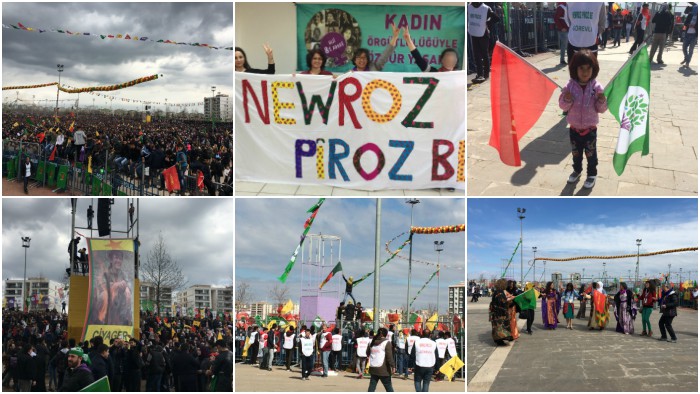
Newroz celebration in Amed was attended by one million people. (Photo: RAWA.org)
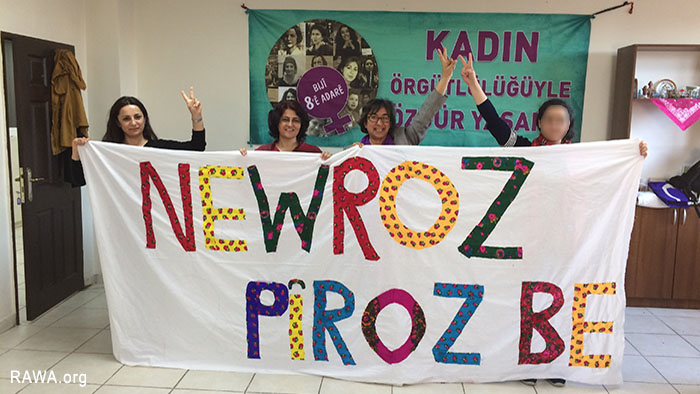
RAWA representative with members of the TJA in their head office. (Photo: RAWA.org)
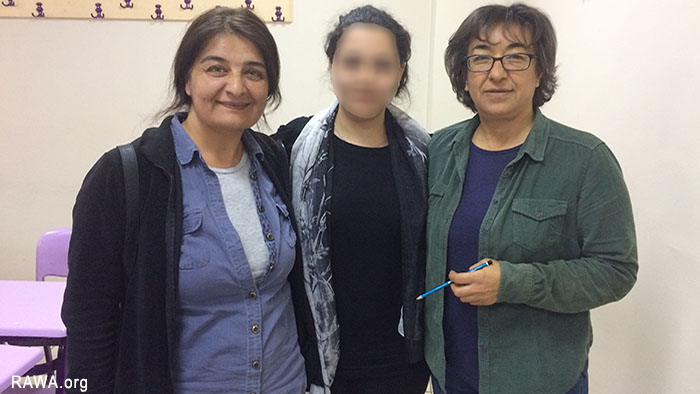
RAWA representative with Figen Aras (left) and Ayşe Gőkkan. (Photo: RAWA.org)

RAWA representative with two mothers from "Peace Mothers". (Photo: RAWA.org)
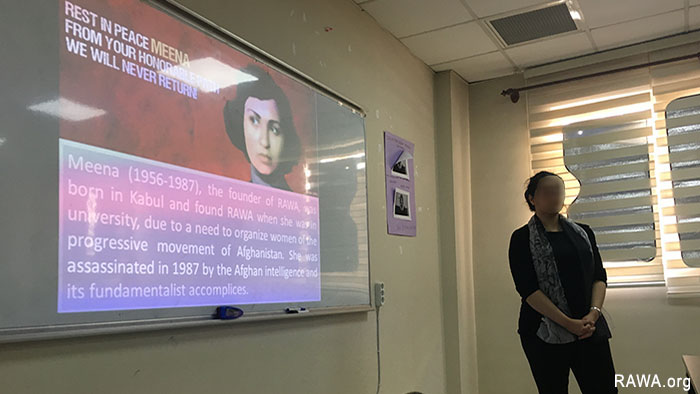
RAWA representative conducting a workshop for the Women’s Academy of TJA. (Photo: RAWA.org)
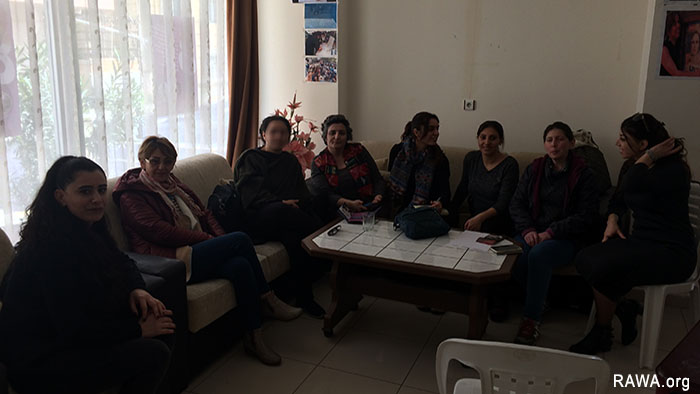
RAWA representative with members of the women worker’s association, Esenyali. (Photo: RAWA.org)

